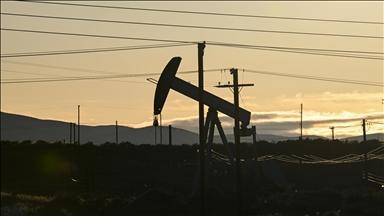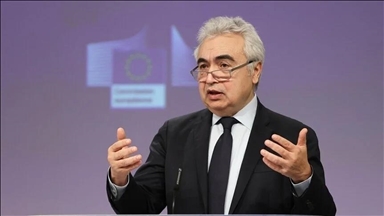Oil prices up as value of US dollar falls
China decides to keep interest rate unchanged, boosting hopes of demand recovery in COVID-hit country

Ankara
ANKARA
Oil prices extended gains on Tuesday from the easing value of the US dollar that encouraged cheaper oil purchases and positive demand indicators from China, the world's second-largest oil consumer.
International benchmark Brent crude traded at $92.14 per barrel at 10.06 a.m. local time (0706 GMT) for a 0.57% gain from the closing price of $91.62 a barrel in the previous trading session.
American benchmark West Texas Intermediate (WTI), trading at $85.05 per barrel at the same time, increased 0.62% after the previous session closed at $84.53 a barrel.
The US dollar had been hovering at around 20-year highs last month, pushing Brent price down to $82 a barrel. Subsequently, the greenback declined in value against other currencies, encouraging buyers of dollar-denominated crude oil.
The US dollar index that pits the dollar against a basket of six global currencies, lost 0.04% to 111.85.
OPEC+ members unite in response to criticism of the group's output cut move
Supply uncertainties that have weighed on COVID-affected markets grew worse with the outbreak of the Russia-Ukraine war, sparking an energy clash between the EU and Russia, the bloc's largest fossil fuel supplier.
As EU countries scrambled to find alternative suppliers, the OPEC+ cartel reduced the collective production target by 2 million barrels per day (bpd) earlier in October.
"Firstly the actual cut is 1.1 million bpd and not 2 million bpd. OPEC has fallen short of its output quota in August by 3.6 million bpd. So, essentially OPEC must consider involuntary cuts first before deciding on voluntary cuts. Involuntary cuts are defined as production cuts not mandated by OPEC e.g. sanctions and outages due to technical problems, civil unrest and war," Randall Mohammed, the former vice president of energy for Ahart Solutions International and energy market commentator, told Anadolu Agency.
Mohammed said OPEC's decision to cut output is based largely on rising interest rates and a strengthened US dollar.
The United States has slammed Saudi Arabia, the de-facto leader of OPEC+, for its November output decision. However, the group's decision has received strong support from individual statements from its member countries.
The Iraqi State Petroleum Marketing Company (SOMO) said the cut is “a significant step in the right direction to achieve market stability especially in light of the current downturn.”
Saudi Arabia said the country was making significant efforts to support balance and stability in the global oil markets, including the formation and upkeep of the OPEC+ alliance.
Several OPEC+ members including the United Arab Emirates (UAE), Oman and Algeria also supported the group’s decision.
"I would like to clarify that the latest OPEC+ decision, which was unanimously approved, was a pure technical decision, with NO political intentions whatsoever," the UAE energy minister Suhail al-Mazrouei wrote on Twitter.
Meanwhile, the People's Bank of China (PBOC) declared it would keep the interest rate on 500 billion yuan ($99.2 billion) in medium-term lending facility loans to chosen financial institutions unchanged at 2.75%.
Experts say that hopes of a demand rebound have strengthened due to the nation's lax monetary policy and supportive measures toward the energy sector.








